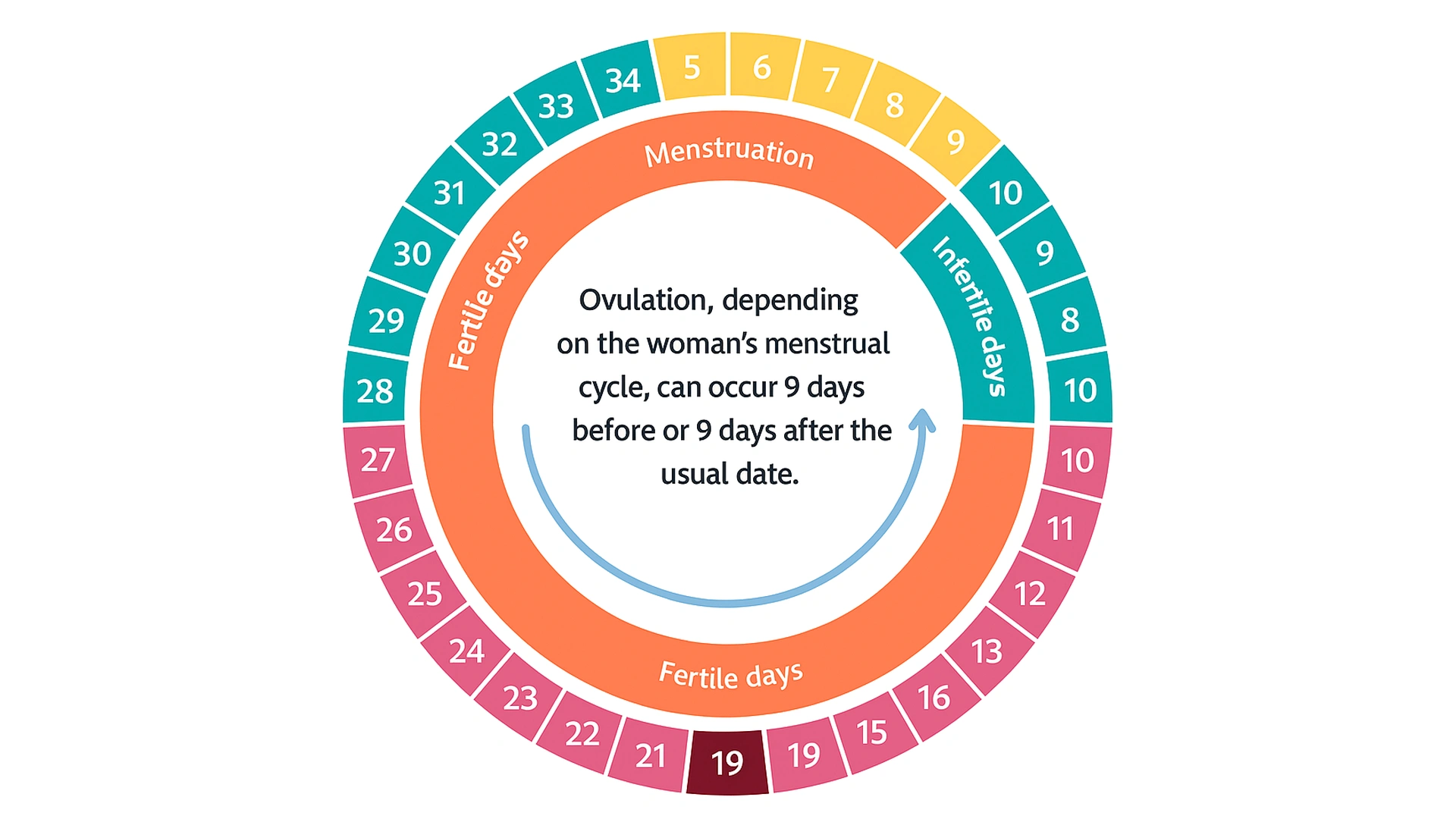

The menstrual cycle is the period that occurs between the first day of one period and the first day of the next. Irregular menstrual cycles can cause many doubts and concerns, especially if you are trying to get pregnant. In this Fertility Madrid guide, we explain whether it’s possible to achieve pregnancy with irregular cycles, how to identify your fertile days, and what strategies can help increase your chances.
What is an irregular menstrual cycle and how does it affect fertility?
An irregular menstrual cycle is one in which the interval between one period and the next varies significantly. Although a regular cycle usually lasts between 21 and 35 days, women with irregular cycles may have shorter or longer periods, or even go months without menstruation (amenorrhea).
Irregular cycles can make predicting ovulation more difficult, but they do not mean you cannot get pregnant. The key is to understand your body and receive specialized medical guidance.
Can I get pregnant if I have irregular cycles?
Yes. Many women with irregular periods become pregnant naturally. However, it can be more difficult to know when you are ovulating, which reduces the accuracy of timing intercourse.
Having an irregular cycle is not synonymous with infertility, but it may require more attention and personalized strategies.
How many days of delay are normal if my cycle is irregular?
It depends on each case. If your cycle constantly varies, it’s common to have delays of several days. However, if more than 35–40 days pass without menstruation, it’s advisable to take a pregnancy test or consult your gynecologist.
In women with irregular cycles, delays do not always indicate pregnancy. They could be due to:
-
Stress or hormonal changes
-
Disorders such as PCOS or thyroid problems
-
Late ovulation
How can I identify my fertile days with irregular cycles?
Although it’s more complicated, it is possible to detect your fertile days if you are irregular. These strategies can help:
Observation of cervical mucus: if it becomes more elastic and transparent, like egg white, you are in your fertile phase.
Ovulation tests: these detect the increase in the LH hormone before ovulation. They are very useful, although they can give false positives if there is a hormonal imbalance.
Basal body temperature: tracking your body temperature every morning helps detect ovulation retrospectively.
For these women, concentrating sexual intercourse around the fertile days will help achieve pregnancy.
Irregular menstrual cycle of 35 days

In women with irregular cycles, every 25–35 days, predicting ovulation is more difficult since it can occur at any time and escape the patient’s control.
Fortunately, there are several strategies you can follow to increase your chances of getting pregnant, even with irregular cycles.
Below, we provide some tips to help you get pregnant if you have irregular cycles:
What can I do to increase my chances of getting pregnant if my cycle is irregular?
For women with irregular cycles, we recommend the following:
-
Have sexual intercourse every 2–3 days to increase the likelihood of the egg and sperm meeting, and consequently, the chances of natural fertilization and pregnancy.
-
Use ovulation tests. These are test strips that detect the rise of the LH hormone in urine. This hormone is released from the beginning of the cycle and reaches its peak 24–36 hours before ovulation, so once you get a positive result, the couple can concentrate intercourse on those days. Caution is needed when using them: in some cases, the test can give false positives or negatives and mislead the couple.
-
Lastly, in patients with very irregular cycles with more than 40–60 days of amenorrhea, predicting ovulation is almost impossible, and sometimes the cycle does not present ovulation (anovulatory cycle). These patients may require help from gynecological specialists and even assisted reproduction treatments to achieve pregnancy.
What methods help calculate ovulation if I’m irregular?
If you are looking for a practical way to track ovulation, you can use a fertile days calculator based on your previous cycles. Still, with irregular cycles, ovulation can occur earlier or later, so:
-
It’s recommended to have sexual intercourse every 2–3 days to increase your chances.
-
If your cycles last more than 40 days or there are months without menstruation, you may not be ovulating (anovulatory cycle).
In these cases, it’s best to consult a specialist.
What should I do if my cycles are very long or I have amenorrhea?
Prolonged absence of menstruation can make it difficult to get pregnant naturally. Some common causes of amenorrhea or anovulation include:
-
Polycystic ovary syndrome (PCOS)
-
Thyroid disorders
-
Low body weight or excessive exercise
-
Chronic stress
In these cases, it may be necessary to:
-
Start ovarian stimulation treatment.
-
Undergo a complete fertility assessment.
-
Consider assisted reproduction treatments such as artificial insemination or in vitro fertilization (IVF).
How can I know if I’m pregnant if I’m irregular and have no symptoms?
If your cycles are irregular and you don’t notice physical changes, you could be pregnant without realizing it. In these cases:
-
Take a urine pregnancy test if you’ve had sexual intercourse and your period hasn’t appeared after 35–40 days.
-
If in doubt, take a blood pregnancy test (beta hCG) for greater accuracy.
Not all women show clear symptoms at first. Confirm as soon as possible so you can receive proper medical follow-up.
When should I see a fertility specialist?
It’s recommended to seek medical consultation if:
-
You’ve been trying to get pregnant for more than 12 months (or 6 months if you’re over 35).
-
Your cycles are longer than 40 days or there are months without menstruation.
-
You have symptoms of hormonal imbalances (acne, excess hair growth, weight gain, etc.).
At Fertility Madrid, we can help you with a personalized assessment and offer you the best options to achieve pregnancy.
Treatments available at Fertility Madrid
Depending on your case, we may recommend:
-
Controlled ovulation stimulation.
-
Artificial insemination during fertile days.
-
In vitro fertilization (IVF) if there are other factors affecting fertility.
We support you with a specialized medical team and state-of-the-art technology.
Frequently asked questions about pregnancy and irregular cycles
Can I get pregnant if I have irregular menstruation?
Yes. Although predicting ovulation is more difficult, many women achieve pregnancy with medical support or by understanding their cycle better.
How many days of delay can be considered normal in women with irregular cycles?
A delay of up to 7–10 days can be normal. If it exceeds 35–40 days, it’s recommended to take a pregnancy test.
Are there treatments to regulate the menstrual cycle?
Yes, depending on the cause. It may include lifestyle changes, hormonal treatments, or assisted reproduction.
How do I know if I have irregular menstruation?
Do you have any questions or need more information?
At Fertility Madrid, we specialize in treatments such as egg donation, in vitro fertilization, or artificial insemination, among others.
Do not hesitate to contact our fertility clinic specialists — they will answer all your questions without obligation.
Other interesting news


Endometriosis: Symptoms the Disease, Effective Treatments, and FAQ

High Prolactin: Causes, Symptoms, Diagnosis, and Treatments

Exercise and Fertility Treatment: Is it Safe to Stay Active?

How to cope with an egg donation treatment?
